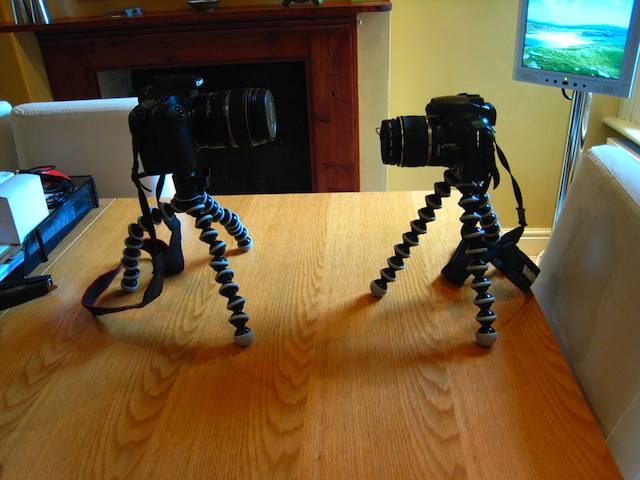
Not sure what this is, but it grew unaided in the cracks between paving slabs in our back garden. They look like chives, but they’re not.


Not sure what this is, but it grew unaided in the cracks between paving slabs in our back garden. They look like chives, but they’re not.

Gorillapod wars. Seen in Ndiyo the other day.
Interesting Washington Post analysis.
The 2008 Reith Lectures have just started on BBC Radio 4. The lecturer this year is Jonathan Spence of Yale, a noted expert on China. His subject is “Vistas of China”. Listening to the first one, a short and pedestrian discourse on Confucius delivered in a monotone, I was struck by the extent to which one of the beacons of British public service broadcasting has been bowdlerised and mangled.
The Reith Lectures were founded in 1948 as a way of bringing important and difficult ideas to the widest possible audience. The series was kicked off by Bertrand Russell on “Authority and the Individual”. The 1952 lecturer was Arnold Toynbee (on “The World and The West”). In 1955, Niklaus Pevsner lectured on “The Englishness of English Art”. In 1957 George Kennan talked about “Russia, The Atom and The West”. In 1966, it was J.K. Galbraith’s turn (on “The New Industrial State”). In 1967, the anthropologist Edmund Leach lectured on “A Runaway World”; in 1970 it was Donald Schon on “Change and Industrial Society”. In 1984, the lecturer was John Searle, who took as his subject “Minds, Brains and Science”. For a complete listing of Reith Lecturers, see here.
As a kid growing up in the intellectual backwoods of rural Ireland, the Reith Lectures were some of the formative experiences of my adolescent life. I was exhilarated by what they represented — great intellects giving of their best; 50 minutes of uninterrupted talk delivered in crystal clear but unpatronising terms, with transcripts available later in the week in The Listener, then the BBC’s house magazine (for which I later wrote).
But then, somewhere along the line, someone in the BBC seems to have decided that the uncompromising full-length lecture was too demanding a form for the contemporary audience, and so the series was deliberately lobotomised. The length of each lecture was reduced to about 20 minutes. Each talk is now delivered to an invited audience with a different venue (sometimes in a different continent) each week. A TV ‘personality’ (currently Sue ‘Legs’ Lawley, formerly hostess of Desert Island Discs) was imported to introduce the speaker and moderate the ‘discussion’. The only thing missing is a set of PowerPoint slides.
The result is an unmitigated shambles. And a disgrace for a public service broadcaster.
Meanwhile, that whirring noise you hear is that of John Reith rotating in his grave at 720rpm.

I’ve just learned that Judy Bailey, who was Superintendent of Computing Services at Cambridge when I was a graduate student, died on May 6. She was a formidable but nice woman with whom I had many, er, discussions about my disk quota on the university’s time-shared mainframe. (Note for younger readers: disk space was once a precious resource.)
Her obituary on the Cambridge web site reveals that she was also an accomplished and dedicated musician — something I hadn’t known. May she rest in peace.
Times obit here.
… in 1989, Chinese army troops stormed Tiananmen Square in Beijing to crush the pro-democracy movement; hundreds – possibly thousands – of people died.
Bet most of the sports fanatics travelling to Beijing for the Olympics won’t remember that. Or give a hoot about it if they do.

Bah! Just when I thought I’d got my bearings in the micro-video market, here comes an even smaller device from Flip Video.
Launched yesterday, it’s described as:
Thinner and smaller than its popular sibling, the Flip Video Ultra, the Mino crams similar technology into a more compact, more attractive package.
Most of the Mino is about redesign. The USB connector now flips straight up, rather than to the side, for an overall more compact footprint that should fit better in a crowded USB environment. Though it has a slightly smaller LCD display–1.4 inches compared to 1.5–the back navigation controls look a mite more sophisticated than before. Pure Digital has also punted the replaceable battery in favor of a nonremovable Lithium Ion model. The company claims you can shoot for 4 hours on a charge.
Like the 60-minute version of the Ultra, the Mino comes equipped with 2GB of memory, capable of storing 60 minutes of its VGA-resolution video. The company has moved up to a later generation image-processing architecture, so in theory the Mino should provide a bit better image quality, and the company says that the camcorder includes an updated–more sensitive–microphone with improved signal processing. And, of course, it comes with in-camera software that provides the plug-in-and-upload simplicity which endears these camcorders to sharers on sites like YouTube and mySpace; the latter is a new partner for the company. In addition, the Mino now supports direct operation on a Mac, without requiring software installation. It also provides a TV-out connector.
Invaluable advice from Patrick House.
Rule 1:
To understand what makes the perfect caption, you must start with the readership. Paging through The New Yorker is a lonesome withdrawal, not a group activity. The reader is isolated and introspective, probably on the train commuting to work. He suffers from urban ennui. He does not make eye contact. Laughing out loud is, in this context, an unseemly act sure to draw unwanted attention. To avoid this, your caption should elicit, at best, a mild chuckle. The first filter for your caption should be: Is it too funny? Will it make anyone laugh out loud? If so, throw it out and work on a less funny one.
Rule 2:
Remember that the Cartoon Editor’s Assistant is “an outsider who has never trod in the cemented garden he protects. He had to look up “urban ennui” when he arrived in New York—he didn’t learn it riding the subway for 25 years. Exploit the fact that Farley is working off the same stereotypes of The New Yorker readership as you are”.
Rule 3:
Apply Advanced Joke Theory.
You must aim for what is called a “theory of mind” caption, which requires the reader to project intents or beliefs into the minds of the cartoon’s characters. An exemplary New Yorker theory of mind caption (accompanying a cartoon of a police officer ticketing a caveman with a large wheel): “Yeah, yeah—and I invented the ticket.” The humor here requires inference about the caveman’s beliefs and intentions as he (presumably) explains to the cop that he invented the wheel. A non-theory-of-mind caption (accompanying a cartoon of a bird wearing a thong), however, requires no such projection: “It’s a thongbird.”
Lovely stuff. My favourite New Yorker cartoon btw shows a giant chesspiece in the middle of a desert, surrounded by cacti and boulders. The caption: “Interesting chess moves, #367. King’s Pawn to Albuquerque, New Mexico.”
If you’re puzzled or shocked to learn that Ted Kennedy was kept awake during the operation to remove his brain tumour, then here’s why. And, no, it isn’t grisly.
Nice Washington Post piece by Eugene Robinson.
Recall that the Michigan primary, like the Florida contest, was not legitimate. Period. As far as the party was concerned — and as far as Clinton herself was concerned, before she fell behind Barack Obama — the primary never happened. None of the candidates campaigned in Michigan. Obama’s name wasn’t even on the ballot.
Yet, in the interest of party unity, the rules committee came up with a formula that gave Clinton credit for 69 delegates that she “won” running virtually unopposed in a vote that technically never took place. Ickes and the angry Clinton supporters who protested the committee meeting objected to the fact that Obama was awarded Michigan delegates that he didn’t win. But Clinton, too, was awarded delegates she didn’t win, because — remember? — there was no legitimate Michigan primary…
As I write, Clinton still hasn’t conceded. My guess is that it’s because Bill still can’t come to terms with the thought that he might no longer be the world’s leading Alpha Male.
Richard Cohen, meanwhile, is pessimistic.
So I see little to be happy about, little that pleases my jaundiced eye. Yes, voter participation is way up and in the end, the Democrats will choose a woman or an African American and, to invoke that tiresome phrase, history will be made. But this messy nominating process has eroded the standing of both candidates. It has highlighted the reality that racism still runs deep and that misogyny, although more imagined than real, is not yet a wholly spent force. This is an ugly porridge that has been placed before us, turned rancid since the cold, pristine days of Iowa only five months ago. We were, with apologies to Bob Dylan, so much younger then.
Reading between his lines, he thinks that the latent racism of many Americans will hand the presidency to John McCain.